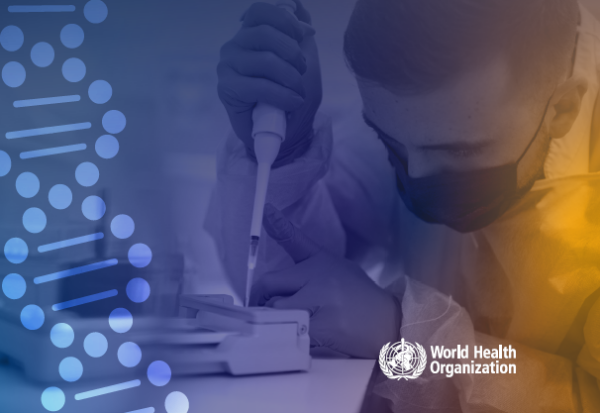The AFROSCREEN project is an initiative in line with the WHO’s ‘Strategy for Genomic Surveillance of Pathogens with Pandemic and Epidemic Potential’
The AFROSCREEN project is an initiative in line with the WHO’s ‘Strategy for Genomic Surveillance of Pathogens with Pandemic and Epidemic Potential’

The AFROSCREEN project is part of the WHO’s ‘Strategy for Genomic Surveillance of Pathogens
WHO recognises that the initiatives carried out by the AFROSCREEN Project align with its ‘Strategy for Genomic Surveillance of Pathogens with Pandemic and Epidemic Potential’.
In 2022, in the wake of the Covid-19 pandemic, WHO published a global strategy document designed to support countries in implementing coherent genomic surveillance systems at national, regional and global levels. (Global genomic surveillance strategy for pathogens with pandemic and epidemic potential, 2022–2032 (who.int)). The organisation recognised that genomics is essential, and will continue to be so in the future, the major role that genomic technologies were already playing, for improving health and quality of life, in all regions of the world, regardless of economic status.
One year later, in 2023, a progress report on the work undertaken by the countries, the WHO and its partners was published. As coordinator of the AFROSCREEN project, ANRS MIE contributed to the drafting of this important document ( Global genomic surveillance strategy for pathogens with pandemic and epidemic potential 2022–2032: progress report on the first year of implementation (who.int)for the definition of the global strategy framework on genomics.
The AFROSCREEN project is highlighted by the WHO for its initiatives in sub-Saharan Africa designed to strengthen genomic sequencing and surveillance capacities while responding to challenges of ‘One Health – Global Health’.
Including 25 partners in 13 African countries (Benin, Burkina Faso, Cameroon, Central African Republic, Democratic Republic of the Congo, Ghana, Madagascar, Mali, Niger, Republic of Côte d’Ivoire, Republic of Guinea, Senegal and Togo), the AFROSCREEN project is coordinated by ANR MIE as part of a consortium of three institutes: ANRS MIE (Inserm), Institut Pasteur and IRD.
The AFROSCREEN project responds to the five objectives chosen by the WHO outlining the features of the ecosystem that will contribute to strengthen genomic surveillance of pandemic- and epidemic-prone pathogens:
- 1. Objective 1: Improve access to tools for better geographic representation
- 2. Objective 2: Strengthen the workforce to deliver at speed, scale and quality
- 3. Objective 3: Enhance data sharing and utility for streamlined local to global public health decision-making and action
- 4. Objective 4: Maximise connectivity for timely value-add in the broader
- 5. Objective 5: Maintain a readiness posture for emergencies
AFROSCREEN is thus contributing to the WHO’s approach of “bringing the benefits of genomics to all in an effective, ethical and equitable manner”.
Read the WHO reports
9789240058125-fre.pdf (who.int)
9789240084773-eng.pdf (who.int)
The AFROSCREEN project is part of the WHO’s ‘Strategy for Genomic Surveillance of Pathogens
WHO recognises that the initiatives carried out by the AFROSCREEN Project align with its ‘Strategy for Genomic Surveillance of Pathogens with Pandemic and Epidemic Potential’.
In 2022, in the wake of the Covid-19 pandemic, WHO published a global strategy document designed to support countries in implementing coherent genomic surveillance systems at national, regional and global levels. (Global genomic surveillance strategy for pathogens with pandemic and epidemic potential, 2022–2032 (who.int)). The organisation recognised that genomics is essential, and will continue to be so in the future, the major role that genomic technologies were already playing, for improving health and quality of life, in all regions of the world, regardless of economic status.
One year later, in 2023, a progress report on the work undertaken by the countries, the WHO and its partners was published. As coordinator of the AFROSCREEN project, ANRS MIE contributed to the drafting of this important document ( Global genomic surveillance strategy for pathogens with pandemic and epidemic potential 2022–2032: progress report on the first year of implementation (who.int)for the definition of the global strategy framework on genomics.
The AFROSCREEN project is highlighted by the WHO for its initiatives in sub-Saharan Africa designed to strengthen genomic sequencing and surveillance capacities while responding to challenges of ‘One Health – Global Health’.
Including 25 partners in 13 African countries (Benin, Burkina Faso, Cameroon, Central African Republic, Democratic Republic of the Congo, Ghana, Madagascar, Mali, Niger, Republic of Côte d’Ivoire, Republic of Guinea, Senegal and Togo), the AFROSCREEN project is coordinated by ANR MIE as part of a consortium of three institutes: ANRS MIE (Inserm), Institut Pasteur and IRD.
The AFROSCREEN project responds to the five objectives chosen by the WHO outlining the features of the ecosystem that will contribute to strengthen genomic surveillance of pandemic- and epidemic-prone pathogens:
- 1. Objective 1: Improve access to tools for better geographic representation
- 2. Objective 2: Strengthen the workforce to deliver at speed, scale and quality
- 3. Objective 3: Enhance data sharing and utility for streamlined local to global public health decision-making and action
- 4. Objective 4: Maximise connectivity for timely value-add in the broader
- 5. Objective 5: Maintain a readiness posture for emergencies
AFROSCREEN is thus contributing to the WHO’s approach of “bringing the benefits of genomics to all in an effective, ethical and equitable manner”.
Read the WHO reports